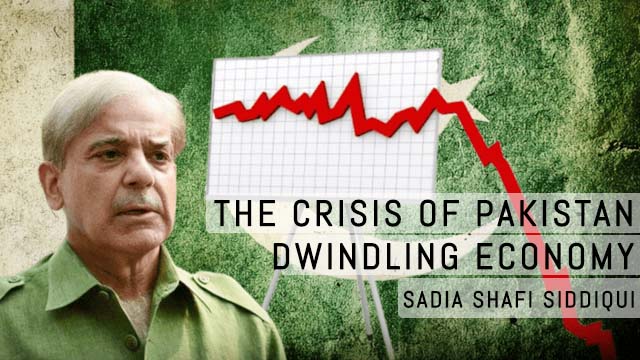Popular News
Top Headlines
Humaima Malick compares brother Feroze Khan to Bollywood legend Amitabh Bachchan
16-September،2024
THE CRISIS OF PAKISTAN DWINDLING ECONOMY

Pakistan is currently ensnared in a profound economic and political crisis, exacerbated by both internal and external factors. The nation is battling high inflation, persistent balance of payments issues, a weakening currency, and critically low foreign reserves. The fundamental issue is that the economy cannot stabilize without a foundation of political stability. Initially, there was a belief that the elections held in February 2024 would pave the way for political stability and enable the newly elected government to address the economic distress. However, these elections have instead led to further deterioration, making the situation more precarious since the Sharif administration took office.
One of the first major hurdles faced by the Sharif government was the formulation of the national budget, which proved to be an exceptionally challenging task. The International Monetary Fund (IMF) was inflexible in its demands, presenting a series of stringent conditions that the government struggled to meet. These conditions included drastic increases in the prices of essential services such as electricity, petrol, and gas. As a result, the budget has imposed a heavy financial burden on the citizens of Pakistan, leading to widespread discontent and protests across the country.
The Impact of rising electricity costs has been particularly severe on the underprivileged sectors of society. Many Pakistanis are finding it increasingly difficult to manage their energy bills, pushing low-income households further into poverty. This economic strain is compounded by a broader political environment characterized by instability and poor governance. The political landscape is marred by intense polarization, which has significantly obstructed effective governance and hindered the implementation of necessary policies. The rule of law is frequently disregarded, undermining public trust in the system and allowing patronage and nepotism to flourish. The practice of meritocracy is often ignored, further entrenching the economic crisis.
The economic challenges facing Pakistan are not confined to domestic issues but have broader implications for the country’s future. Excessive borrowing has led to a staggering increase in national debt, while low productivity levels have exacerbated the situation. Additionally, the country faces difficulties in enhancing its export performance and increasing revenue streams. Investor confidence remains low due to ongoing economic uncertainty, which further hampers growth prospects. Corruption is a major concern, with Pakistan ranked 140th out of 180 countries in Transparency International’s corruption index, reflecting a high level of perceived corruption.
The current economic predicament is also characterized by extreme inflation, making life increasingly difficult for ordinary Pakistanis. Government policies intended to improve the standard of living for common people have largely failed to achieve their goals. Addressing the complex political and economic crises in Pakistan necessitates a comprehensive approach. This approach should encompass political stability, accountability, meaningful dialogue, and effective governance. The interdependence of political stability and economic health in Pakistan is evident, yet political instability continues to undermine efforts to achieve economic recovery. The military’s entrenched role in politics further complicates the situation, contributing to ongoing controversy and instability.
Externally, Pakistan’s financial situation is exacerbated by its significant external debt, totaling approximately $97 billion, with around $50 billion owed to China. The Chinese government is increasingly concerned about the repayment of its financial assistance, which has been crucial for supporting Pakistan’s economy. The China-Pakistan Economic Corridor (CPEC) has faced growing opposition, adding another layer of complexity to Pakistan’s financial landscape. The Pakistani leadership must recognize that global trade relationships are now governed by mutual benefit rather than ideological alliances. Despite continued friendly relations with China, the pressing issue of repaying substantial loans remains a challenge. Pakistan is obligated to repay at least $8 billion within the next year, reflecting the critical nature of this financial commitment.
At the same time, the United States, a long-standing ally, has voiced concerns about Pakistan’s growing relationship with China. Recently, U.S. Secretary of State Donald Lu announced a $1 billion aid package for Pakistan, but he also urged the country to reconsider its strong ties with China. The U.S. suggested that improving relations with America might offer greater future benefits compared to the past investments made by China. Pakistan, however, has firmly rejected the idea of sacrificing its relationship with China in favor of enhancing ties with the United States. The Pakistani Foreign Office has emphasized that it does not believe in zero-sum relationships and maintains that the growing partnership with China should not disrupt regional balance.
If the relationship between Pakistan and China were to become strained, it could have severe repercussions for Pakistan’s already fragile economy. The potential impacts of such a shift must be carefully assessed, as the balance of power in the region and Pakistan’s economic stability are deeply intertwined with its foreign relationships and internal governance. The ongoing economic and political crises in Pakistan highlight the urgent need for a multifaceted approach to stabilize the country and ensure a more secure and prosperous future.












